On February 26th, 2018, Israel’s 4th Foreign Law Firms Conference took place in Tel-Aviv (see photo album). More than 450 leading lawyers from more than 20 countries attended, making it Israel’s biggest legal international conference.
The Conference had a dual purpose: to serve as a meeting point for Israeli and international lawyers, and a legal-academic conference for attorneys from all over the world (view the agenda). Although this was the fourth time the conference took place and run by Robus Consulting & Legal Marketing, it was the first time that it was produced as part of the collaboration between the Israel Bar Association and the American Bar Association.
The conference began with lectures delivered by a number of keynote speakers; Adv. Efi Naveh, President of the Israel Bar Association, and Adv. Zohar Fisher, founder of Robus Consulting & Legal Marketing, delivered introductory remarks. Adv. Hilary Bass, President of the American Bar Association, then began the session of speeches, and spoke about the cooperation and fruitful relationship between the American and Israeli legal systems. She then discussed the importance of guarding and protecting the independence of the courts, and talked about the actions that the American Bar Association is pursuing in order to preserve the independence and status of the US courts. To see the full speech, click here
Adv. Michal Halperin, the General Director of the Antitrust Authority, discussed the new reform that the Antitrust Authority is promoting today. In her speech, she referred to three main parts of the reform: changing the definition and interpretation of “monopoly”, from quantitative to fundamental, examining companies in light of their market power. In addition, the Authority is looking to reduce the obligation to report on small mergers by raising the required reporting financial threshold, thus bridging the gap with other OECD countries. Finally, the Authority plans to reduce the decision delivery time on applications of exemption from restrictive trade practices from 90 days to 30 days, meeting the delivery time of merger cases. The General Director also referred to the criticism raised regarding the uncertainty concerning enforcement in Israel in comparison to countries such as the United States, and explained the fundamental differences between the markets. At the end of her speech, Adv. Halperin addressed the antitrust risks and threats inherent to Big Data companies due to their enormous influence on various aspects of life (privacy, protection of information, etc.). To see the full speech, click here
Adv. Zafrir Neuman, the Chief Legal Counsel of the Israel Innovation Authority, subsequently gave his address and reviewed the Authority’s activities. He referred to the advantages that the public sector has over the private market in encouraging technological developments; mainly due to the tools at the public sector’s disposal, its ability to absorb failures, tax benefits, regulation, cooperation with other countries, etc. In addition, Adv. Neuman discussed the Israeli characteristics which make it a global leader in technological developments, including academia, R&D centers in the IDF, government support and Israel’s general start-up culture. To see the full speech, click here
After the opening remarks, three panel sessions began on a variety of topics:


Panel 1: Hostile Takeovers
Adv. Sharon Amir from Naschitz Brandes Amir chaired the Hostile Takeovers Panel. Both Adv. Warren Taylor from CMS Cameron McKenna Nabarro Olswang LLP (UK), and Adv. Mathis Reif from DWF (Germany) both addressed the EU regulations. While England has adopted the regulation and allows for takeovers to take place quite simply, Germany has added legislation making it difficult to carry out such a process.
Adv. Barak Platt from Yigal Arnon & Co. referred to the Israeli market, explaining that a takeover is only possible through a purchase offer and that it is very difficult to complete such a process. He also noted that because of the holding structure of technology and start-up companies’ shares, it is almost impossible to take control of such companies because of the high backing requirement of 95% of shareholders.
Adv. Yechiam Cohen, Corporate VP, General Counsel & Corporate Secretary at NICE Systems, discussed afterward the role of external directors who serve as the shareholders’ protector, as well as the restrictions that apply to the takeovers of companies in which the Israel Innovation Authority has invested in and companies that deal in security related products.
Panel 2: Cyber Security
Adv. Richard Mann from Gross, Kleinhendler, Hodak, Halevi, Greenberg & Co. chaired the panel dealing with cyber security. Adv. Ariel Nachman from Simmons & Simmons LLP (Italy) commenced with a schematic description of a cyberattack and the company’s conduct in the hours that follow the discovery. He explained that the first step – discovering that the company has been attacked – takes an average of 146 days, and that most of the attacked learn about the attack from external factors, for example when a ransom is demanded. Adv. Nachman then described the next 72 hours, explaining that these are the most critical hours in managing the attack.
Adv. Clarissa Coleman from K&L Gates LLP (UK) expanded on this matter and related to the obligation of companies – including law firms – to determine risk management policies both in terms of management and access to computerized systems and in terms of insurance coverage. She also emphasized the importance of training employees and planning the sequence of actions in the event of an attack.
CPA Doron Ronen, Vice President of the Association of Internal Auditors in Israel, referred to the Israeli context and cited the Interpol report which states that Israel suffers 10,000 cyber attacks every minute. Ronen in addition referred to the importance of risk management and explained that 80% of businesses from whom credit details had been stolen had been closed because customers stopped trusting them and did not return.
Adv. Nimrod Kozlovski from Herzog Fox & Neeman commented on the need to build an active defense system and suggested inter alia attacking the firm’s defense system in order to check its efficiency and identify its weak points. He explained that in his experience, companies that solely practice simulations of attacks are not able to cope with a real attack in real time.
Adv. Alan Suttin from Greenberg Traurig LLP (USA) referred to the role of lawyers and the need for companies to use them in advance to gain immunity from lawsuits. Adv. Suttin referred to the European Union’s GDPR regulations (EU Privacy Regulation) that will come into effect soon, explaining that since no company will meet the requirements, he expects that the authorities will choose a company to serve as an example for the market. The function of the attorney as he explained, is to ensure that their client does not become that example.
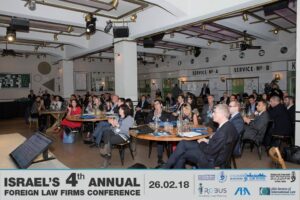
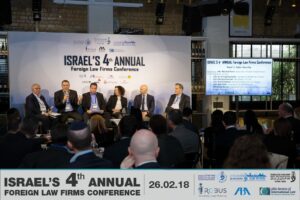
Panel 3: Fintech
Adv. Ariel Rosenberg from Goldfarb Seligman & Co., chaired the Fintech panel and discussed the new developments in the field. Adv. Amber Dolman from Goodwin Procter LLP (USA) addressed the new phenomena in the field and explained that Fintech companies operate in areas where the large traditional companies are not active.
Adv. Zach Lichtblau from Bonnard Lawson (China) referred to the Fintech and electronic payments industry in China, and even shared his strange feeling as a native Tel-Avivian when he returns to Tel Aviv and has to carry cash in his pocket.
Adv. Jacob Enoch from M. Firon & Co. commented on Blockchain technology, explaining that it is impossible to talk about Blockchain without talking about cryptocurrencies. He explained that Blockchain transactions are dependent on coins, and therefor they are here to stay. Regarding the ICO phenomenon, he explained that they constitute an IPO to a certain extent, and are likely to be subject to regulation because there are all sorts of secondary markets. He said that what is interesting is the new financing concept, and that the main problem is not the regulatory issues, but the new paradigm that allows for companied to rais funds without giving investors a stake in a company.
Adv. Eitan Levinson from Covington & Burling LLP (USA) explained that whilst the United States market is a huge and attractive, administrative enforcement is terrible, and there are many legal requirements to be addressed, and that the challenge in the US is to find people that have the knowledge as to how regulators handle new issues. Adv. Jay Kalish, OurCrowd General Counsel, explained the company’s model, which essentially democratizes investments in companies, and enables individuals to create a portfolio of small $10,000 investments in a number of companies.
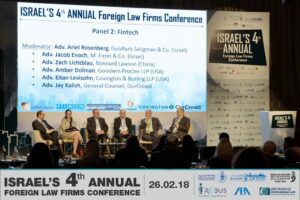
Panel 4: International Disputes
The panel on international disputes was led by Adv. Gil Orion from Fisher, Bechar, Chen, Well, Orion & Co. According to Adv. Neil Miller from Norton Rose Fulbright (UK), 92% of respondents to a recent survey prefer to seek mediation, but only 50% actually do so. In his opinion, the more international the conflicts become, such as the conflict between Israel and Egypt over gas, there is no choice but to turn to mediation. He also explained that mediation offers a range of advantages which are very important and which traditional litigation does not contain – flexibility, neutrality and secrecy. Regarding international enforcement, Adv. Miller noted that there are very few agreements between states regarding the enforcement of judgments, but specifically in mediation decisions there is a treaty signed by 157 countries, such that when one is talking of an international conflict, mediation is a more effective solution.
Adv. Ben Aram from Kennedys Law LLP (UK) presented a different viewpoint and said that he recommends his clients to waive mediation and go to court. He explained that if the contractual agreement determines the jurisdiction, a good attorney can be found there and a good ruling will be issued. On the other hand, if one chooses mediation, it can take up to a year to complete the search and choose the mediator, making the procedure more expensive and confusing. Adv. Aram additionally argued that mediators tend to stretch out the proceeding due to the hourly payment structure, besides which it is not possible to appeal a bad decision. Adv. Mark Beckett from Cooley LLP (USA) referred to the possibility of turning to mediation in petitions against the regulator, and explained the difficulty inherent to this because of the variety of different treaties and laws in the various countries.
Adv. Ram Jeanne from Amar Reiter Jeanne Shochatovitch & Co., spoke about the Israeli market and explained how the courts in Israel relate to mediation clauses. Adv. Jeanne also referred to the considerations that must be taken into account before embarking on a litigation process in Israel. He continued by saying that the low financial cost – due to attorney fees and court costs – coupled with court’s case load make litigation very worthwhile for a client who wants to buy a little more time. Adv. Juan Ruiz Garcia from Cuatrecasas (Spain) referred to the situation in Spain, where more than 2 million cases are waiting to be heard before the court. Therefore, similarly to Israel, a client who wants to resolve a conflict cannot rely on the court system, even though its rulings tend to be better. He explained that in the current situation it could take up to two years to receive a ruling, and if the counterparty appeals, the case may stay unresolved for many more years.
Panel 5: Intellectual Property
Adv. Anthony Bloch from S. Horowitz chaired the Intellectual Property panel. Adv. Dani Kramer from Mathys & Squire LLP (UK) commented on the difficulty experienced by Israeli companies in protecting their patents due to the need to adapt to the European and Chinese rules, therefore emphasizing the importance of initial planning. Adv. Christopher Mesnooh from Fieldfisher (France) referred to the French law which recognizes two different rights: a non-transferable moral right, and an additional patrimonial right which may be transferred, and to the difficulties and conflicts between French law and others. Adv. Gideon Rosenberg, Deputy General Counsel & VP of Legal Affairs at Mellanox Technologies explained the importance of having a holistic perspective on the protection of inventions, and warned against settling with patent registration alone. Afterward, Adv. Zeev Pearl from Pearl Cohen Zedek Latzer Baratz spoke about the importance of having an industry specific approach. Later he described their payment model in which they create teams with local firms and work with start-ups for free under the concept that being part of the team will pay off in the future. Adv. Michael Rosen from Kobre & Kim (USA) spoke about the Litigation Fund phenomenon, which offers a new financing model for litigation and has also penetrated the field of intellectual property.
Panel 6: Artificial Intelligence (AI)
Adv. Michael Barnea from Barnea & Co. chaired the Artificial Intelligence (AI) Panel. Adv. Ben Haklai, Commercial Legal Lead at Microsoft Israel, began with a general overview of the various types of AI. Thereafter Adv. Jay Lefton from Fasken Martineau DuMoulin LLP (Canada) referred to the revolution of AI technologies and even referred to the future possibility of recognizing criminal liability and human rights of such technologies.
Adv. Omer Bekerman from Amit Pollak Matalon & Co. referred to the large concentration of AI research centers in Israel, and to the growing demand for employees in the market. He explained that Israel is lagging behind the rest of the world in regulatory matters in the field of AI, and that there is now an overflow of such companies in the market. Adv. Keita Tokura from Anderson Mori & Tomotsune (Japan) described the widespread phenomenon in Japan regarding collaborations between large manufacturing companies and AI start-ups in an attempt to streamline production processes. Adv. Steven Richman from Clark Hill PLC (USA) referred to the existing legal instruments, arguing that existing legislation is sufficient and that no additional legislation is required for AI.

Following the panels, the conference was concluded with a prestige gala event, at which Ms. Tamar Sacerdoti, Head of the International Department at Robus Consulting & Legal Marketing, gave a few parting words. All participants were invited to stay for the gala event, giving everyone a chance to meet new people, network and further discuss the various topics that were raised throughout the day. Throughout the conference a start-up exhibition was held in the courtyard, showcasing a variety of leading Israeli legal startups, including Lawgeex, which deals with AI based contract analysis, 3Lawgy, which provides a platform for financial claims, and ShapeDo, an E-Discovery platform and analysis of design and planning drawings in planning and construction disputes. Other start-ups that presented at the event were Bizzaboo, which offers an event management platform, and Amaryllis, which has developed a customizable modular white label payment platform.
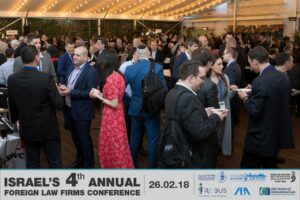
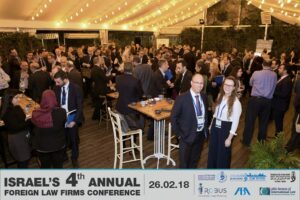

For photos of the conference click here.
For more details about the conference in general and speakers in particular – www.iflfc18.com






